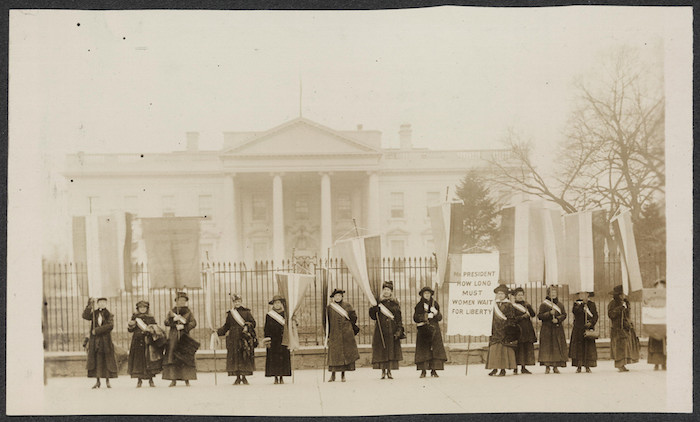By Amy Clukey
This year’s election has taken on a different tenor as suffragette nostalgia has flooded social media (props to my friend Brigitte Fielder for coining the phrase “suffragette nostalgia). Chelsea Clinton gave her a mother an antique suffragette sash for her birthday. There are memes galore. You can watch a live stream from Susan B. Anthony’s grave, where women in Clintonian pantsuits have stuck their “I voted” stickers to her headstone. It seems like everyone is sharing articles about individual suffragettes and stories about women born before the 19th Amendment who have voted for Hillary Clinton.
Most striking are the clothes. We are dressing up for Election Day. Along with t-shirts emblazoned with “Nasty Woman,” “Vagenda of Manocide,” and “Nov 8th Pussy Grabs Back!,” women are posting pictures of themselves in suffragette white, wearing the suffragette colors purple, green, and white, and putting on blue stockings to show allegiance with, well, Bluestockings. Some women are even voting in suffragette costumes. Then, of course, there’s the pantsuit. Pantsuit Nation, the not-so-secret Facebook group with over 2.6 members, has turned what might in other contexts might be seen as a symbol of a narrowly defined, privileged Lean In-ish liberal feminism into a signifier of political change. I find myself wondering if, somewhere out there, Beyonce and Kathleen Hannah are currently wearing pantsuits.
All this joyful sartorial bonding is a resounding departure from how Americans usually remember suffragettes with black-and-white photographs of serious women wearing seriously big hats, and, of course, the flighty Mrs. Banks of Mary Poppins—who neglects her rambunctious children to parade around London and forces her beleaguered servants to sing “votes for women!” songs. Indeed, the suffragettes have long been marginalized in American history history and popular culture: we see Susan B. Anthony’s stern profile in history books, but we don’t really hear about Lucy Stone, Ida B. Wells, and Alice Paul, and we certainly don’t hear about the physical attacks, harassment, and force feedings many suffrage activists endured.
Suffragette nostalgia on Election Day allows us to collectively revise historical narratives, including the waves model of feminist history, that put a gulf between Us (liberated! Empowered! Intersectional!) and them (antiquated, restricted, petticoat-ed). In place of dramatic historical breaks, we celebrate the continuities between their political efforts and our own. We remember their fights for safe contraception, reproductive health, economic opportunity, sexual freedom, and political inclusion. We can see how early twentieth-century depictions of women activists as shrill manhaters, ugly spinsters, or manipulative flirts resonate with current stereotypes of feminists as ugly, angry, (funnily enough) prudish sluts.
Although suffragette nostalgia has turned what could have been a day of fearful waiting into a day of joyful celebration and community building, we also need to be wary of its dangers, for the suffragettes offer us lessons in both their successes and their failures. Black feminists have long pointed out that the racism of white suffragettes and the political efforts of black women. As one of my friends, Joanna Davis-McElligatt often notes, not all women were enfranchised by the 19th Amendment. Indeed, the historical marginalization of black women in the campaign for the vote mirrors the marginalization of women of color within the feminist movement today. White feminists still need to take a hard look at Elizabeth Cady Stanton’s racist arguments for giving educated white women the vote and Alice Paul’s exclusions of black feminists from her 1913 march on the capital. We need to put Anna Julia Copper and Ida B. Wells at the center of feminist history, and talk about the phenomenal suffrage efforts of Fanny Lou Hamer and Rosa Parks. We need to celebrate Shirley Chisholm’s political career alongside Hillary Clinton’s.
American feminism has been on the defensive for a very long time. Despite the hope for social and political change that greeted his first term in office, the Obama years have not been kind to women. We have been endured debates about “rape rape” versus “fake” rape. We have watched the expansion of the anti-choice movement and its attempts to roll back access not only to abortion, but also to contraception. We’ve been inundated with stories of black cis-women and trans-women murdered in jail cells. We watched George Zimmerman get away with murder because he “stood his ground” while Marissa Alexander sat in jail for firing a warning shot at her abuser. We’ve seen endless footage of extremely powerful and extremely stupid white men making absurd declarations about vaginas and uteri.
Watching the tsunami of misogyny that has been hurled at Hillary Clinton over the last year — not only by her Cheeto-hued opponent and his supporters, but also by mainstream media outlets, Bernie supporters, and by other supposed progressives — has been the icing on the shitcake of the ongoing War on Women. And we have had enough.
The suffrage movement once brought together a broad coalition of women activists from a variety of backgrounds and engaged women who might not otherwise be politically active. After the passage of the 19th Amendment, that movement seemed to disintegrate overnight. We can’t let that happen again. A woman president is not an end in itself. It’s a beginning. Whether or not Hillary Clinton is elected tonight (PLEASE GOD LET HILLARY CLINTON BE ELECTED TONIGHT), we are already anticipating a backlash. But for now, we celebrate.
Amy Clukey is an assistant professor of English at the University of Louisville where she is currently teaching an honors seminar on the suffragettes.


